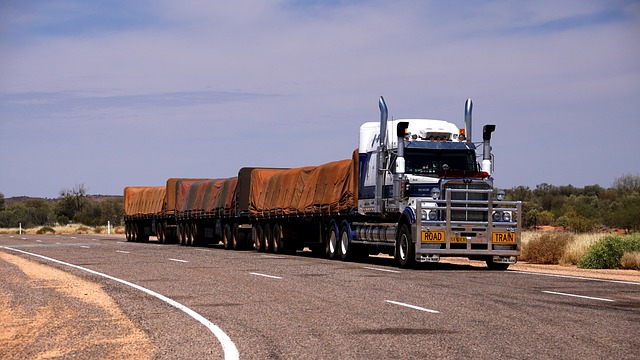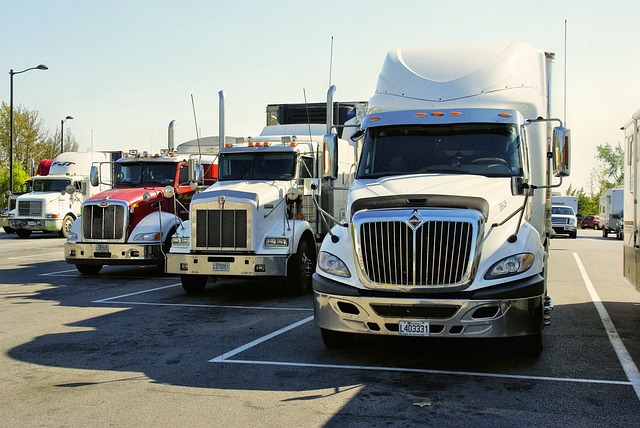Physical damage coverage is a crucial aspect of insurance for fleet truck owners, protecting against unexpected costs from accidents or incidents damaging vehicles. Specialized plans designed for small fleets offer cost-effective collision and comprehensive coverage tailored to trucking operations' unique needs. Fleet managers should assess their vehicle protection requirements to select suitable plans, ensuring their investment in the trucking fleet remains secure with affordable options available for small fleets.
Understanding Physical Damage Coverage for Fleet Trucks

Physical damage coverage is an essential component of insurance for fleet truck owners. It protects against unexpected costs arising from accidents or other incidents causing physical damage to vehicles within a fleet. This type of insurance covers repairs or replacements, ensuring that truck operators can maintain their vehicles in top condition and minimize downtime. For fleet managers, understanding the nuances of physical damage coverage is crucial to making informed decisions regarding risk management.
When considering options for truck repair insurance, businesses should look beyond standard policies. Specialized plans tailored for small fleets offer affordable physical damage protection, catering to the unique needs of trucking operations. These policies typically include collision coverage for fleets, comprehensive fleet insurance, and flexible coverage options that can be customized to suit varying business requirements. By evaluating their fleet vehicle protection needs, operators can select the most suitable plan, ensuring their investment in their trucking fleet is secure.
– Definition and significance of physical damage coverage

Physical damage coverage is a crucial component of insurance for trucking fleets and small vehicle operations. It refers to protection against financial loss resulting from physical harm or damage to fleet trucks, vans, or other vehicles during operation. This type of coverage is significant as it safeguards businesses from the high costs associated with unexpected repairs or total losses due to accidents, natural disasters, or other unforeseen events. By including collision and comprehensive insurance policies in their plans, fleet owners can ensure their vehicles remain operational and reduce financial strain on their businesses.
For trucking companies, having adequate physical damage coverage is essential for several reasons. It helps maintain a reliable fleet, which is vital for meeting customer demands and adhering to delivery schedules. Moreover, it provides peace of mind, knowing that unexpected events won’t cripple operations due to costly vehicle repairs or replacements. With affordable physical damage plans available, small fleets can also access comprehensive protection without breaking the bank. This insurance plays a pivotal role in ensuring trucking fleet longevity and financial stability.
– Key components of a comprehensive fleet insurance policy

When it comes to safeguarding your trucking fleet, a comprehensive insurance policy is non-negotiable. Key components include collision coverage, which protects against damages incurred in accidents, and comprehensive coverage that extends protection to various risks beyond collisions—such as theft, vandalism, and natural disasters. Truck repair insurance ensures that routine maintenance and unexpected repairs are covered, minimizing financial burdens associated with keeping your fleet on the road.
Affordable physical damage plans for small fleets offer tailored solutions without breaking the bank. These policies prioritize fleet vehicle protection by addressing potential damages, ensuring your trucks are operational and safe. In a sector where downtime can be costly, comprehensive fleet insurance acts as a lifeline, providing peace of mind and financial security for trucking businesses of all sizes.
Challenges in Maintaining Adequate Physical Damage Coverage

Maintaining adequate physical damage coverage for fleet trucks is a multifaceted challenge. One of the primary hurdles is balancing cost and comprehensiveness. Trucking companies, especially small fleets, often face budget constraints that make it difficult to secure robust truck repair insurance policies at affordable rates. This tension is exacerbated by the high replacement and repair costs associated with modern fleet vehicles, which can significantly impact operational profitability.
Furthermore, managing collision coverage for fleets presents complex risks. Fleet vehicles are frequently in operation, increasing their exposure to accidents and damage. Comprehensive fleet insurance that covers a wide range of physical damage scenarios, from fender benders to more severe collisions, is essential but can be costly. Effective risk management requires tailored policies that balance protection against financial strain, necessitating careful consideration of coverage limits, deductibles, and specific vehicle usage patterns.
